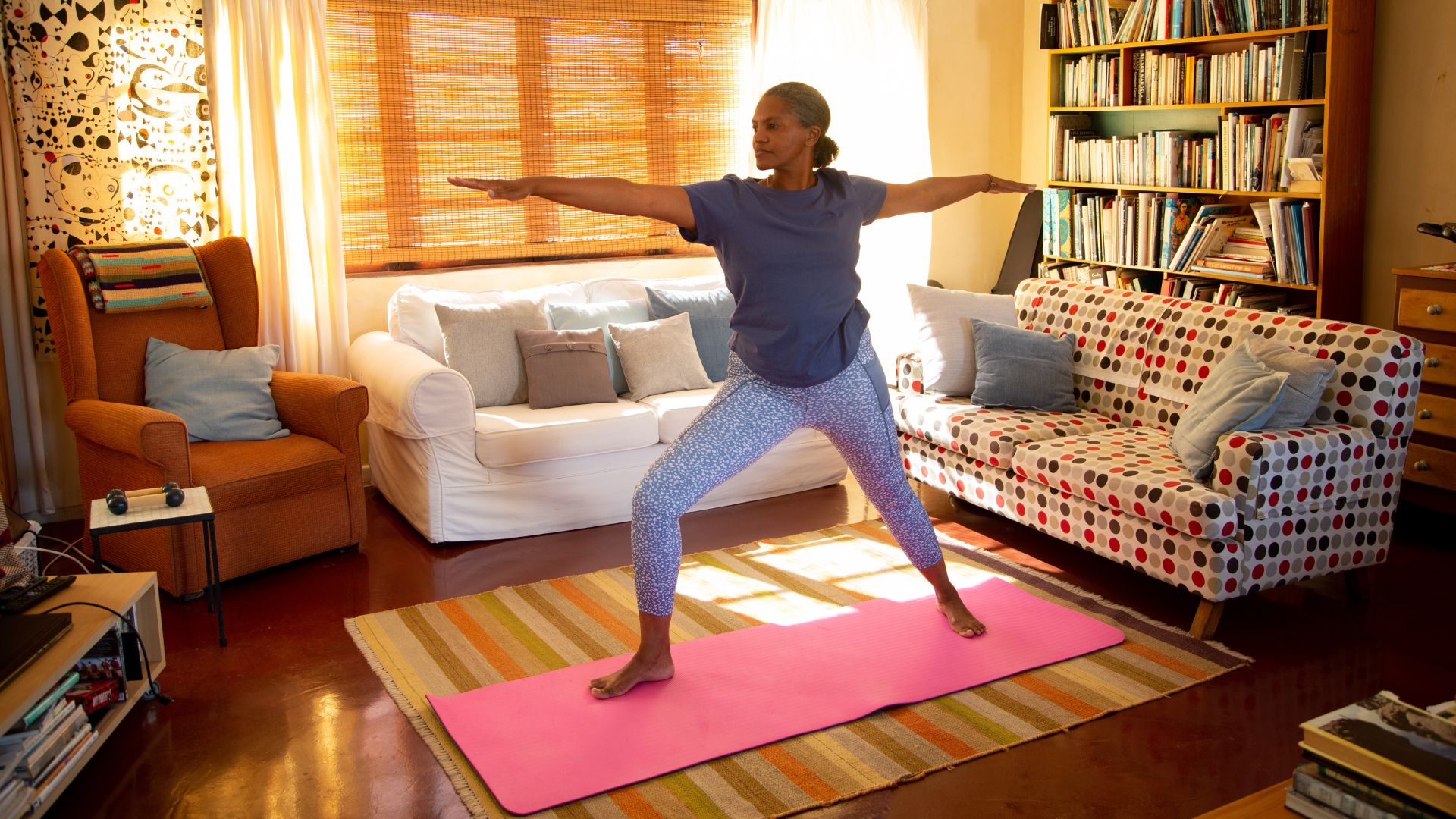Is it better to exercise in the morning for weight loss? Experts reveal the best time of day to work out
Exercise in the morning may be better for some people, especially when it comes to losing weight. Here's why


Is exercise in the morning better for weight loss? When it comes to losing weight, we want to make sure we're doing it in the best way possible, using methods that'll stand the test of time. Whether it's the workouts that burn the most calories, the meals with the lowest calories but the highest amount of protein, or the time of day we exercise. However, it's rarely that simple.
Weight loss is a highly personal thing. As everybody's body is different, just because something works for one person doesn't mean it'll work for another - and that includes the timing of exercise. The ideal workout time for you will be far more dependent on lifestyle factors like family life, work commitments, and eating schedule, than biological factors.
But what benefits does working out in the morning offer? Here, we speak to two personal trainers to reveal whether exercise in the morning is better for weight loss, what to eat before your workout, and the real benefits of setting an alarm to work out. Whether you're looking to lose a stone or just a few pounds and lose weight without dieting, this is what you need to know.
Is exercise in the morning good for weight loss?
Yes, exercise in the morning can be great for those wanting to lose weight healthily and sustainably - but it's not necessarily better than working out in the afternoon or the evening. The best time to exercise is personal and based on your lifestyle factors, such as family, work life, and eating schedule, more so than anything else.
When it comes to weight loss, the most important thing is that you're in a calorie deficit. "There's no silver bullet or magic formula when it comes to fat loss," explains certified personal trainer Aroosha Nekonam, who works with Ultimate Performance. "It's our overall energy balance that determines whether we lose, maintain, or gain weight."
To put a calorie deficit simply, in order to lose weight, you need to consume fewer calories than you burn every day. "The timing of when you consume your calories is largely irrelevant if your goal is weight loss," she says. "You could have them all in one meal or spread out throughout the day. So long as you remain in the deficit, you will lose weight. But if you don’t track your calories, and end up being in a calorie surplus, you will gain weight." This is why many people believe they are in a calorie deficit but not losing weight.
If you feel more comfortable in the evening, that will be the best time to work out as you're more likely to actually do the workout, burn the calories, and build muscle, which counts for a whole lot when you're trying to lose weight.
Sign up for the woman&home newsletter
Sign up to our free daily email for the latest royal and entertainment news, interesting opinion, expert advice on styling and beauty trends, and no-nonsense guides to the health and wellness questions you want answered.
However, there are some benefits to exercise in the morning, as the personal trainers reveal.
1. You may develop better sleep habits
Getting up earlier to work out in the morning forces you to go to bed earlier, explains Nekonam. "Getting to bed earlier and sleeping better, in turn, will mean you recover better. Your stress hormones will be lower, your pain tolerance will be higher, your immune system will function better, and you will be better able to regulate appetite," she says.
"Sleep is a cornerstone of good health, so generally every aspect of your health and wellbeing will improve, including (but not just) your ability to build muscle and burn fat."

2. You're more likely to stick to your routine
If you're someone who struggles to establish a routine with exercise and finds that life gets in the way of your exercise goals, then working out in the morning could certainly be a better idea.
"Getting it done first thing in the morning means you are not going to skip the workout, says Nekonam. "This is compared to later in the day when your schedule might take over or you've had a stressful day at work, all of which might negatively impact your performance in the gym, or worse, cause you to skip the workout altogether."
It's easily done - and easily one of the biggest weight loss mistakes around. Skipping workouts will limit the number of calories you burn in a day, putting all the focus of your calorie deficit on your eating habits.
3. You might move more through the day
When we talk about burning calories, we don't just mean through exercise. Non-exercise activity thermogenesis (NEAT) activity makes up for about 10 to 15% of your total calorie burn for the day, according to a report by Jena University Hospital. These are the calories you burn on the move but not exercising - for example, walking around the house, walking the dog, gardening, and so on.
According to further research by Brigham Young University, working out in the morning means you're more likely to move more through the day, increasing your levels of NEAT and so burning more calories. The researchers found that participants who walked for 45 minutes in the morning then had an increased level of activity over the next 24 hours.
While this won't work for everyone, it's worth considering whether you could add in some walking workouts or even just walking meditation to your day if you're looking to lose weight.
3. You'll feel better for it
Unfortunately, the rumours are true. One of the reasons many people do yoga every day and start running for 30 minutes a day in the morning before work is how it makes them feel.
"If you get up early and the first positive thing you do in the day is training, you feel good," explains Nekonam. "You get the release of endorphins, you get blood pumped around your body and brain. Your stress hormones go down. That means you go out feeling energised and ready for the day ahead, making you more productive and creating a positive feedback loop. This improves all aspects of your health, recovery, training, and nutrition."

4. Working out in the morning can help control your appetite
As noted by Nekonam, getting enough good quality sleep can help to control your appetite levels - but research shows that exercise in the morning alone can do this too.
The research, also by Brigham Young University, explains that working out in the morning can help to reduce levels of hunger hormone ghrelin in the body while increasing hormones linked to fulness, like leptin. In the study, researchers reviewed women who walked every day for 45 minutes and showed them photos of flowers (the control) and food. A week later, when shown the same photos without walking in the morning, the women had a stronger response to the photos of food.
There's a lot more that goes into controlling our appetite than this (and other research suggests you should never exercise on an empty stomach), but it goes some way to suggest that exercising in the morning can help to regulate hunger hormones, meaning you may eat less.
5. You're likely to concentrate better
Boredom, tiredness, and lethargy are all feelings that can make us want to snack through the day. While there's nothing wrong with snacking when you're trying to lose weight - in fact, opting for some of the best high-protein low-calorie foods could really help - snacking too often, or on high-calorie foods, will likely pull you out of your deficit.
We know that exercise, no matter the time of day, can help to improve our concentration. But if you find yourself snacking before lunch, then a morning workout could be the answer. Studies linked to the University of Western Australia and Parthenope University of Naples have found that exercise improves attention, learning, and decision-making skills.
What to eat before exercise in the morning
If you decide that a morning workout is for you, you may want to eat something before you head out. "20 to 30g of good carbs and 20 to 30g of high-quality protein, eaten about an hour before you workout can make a huge difference," says Nekonam.
"You need to properly fuel your body beforehand if you're going to put your body through stress," she adds. "High-intensity exercise, lifting heavy weights, long runs, etc, all require the body to expend a lot of energy. That's why they are so effective at burning calories. But to get the most out of these types of exercises, you're going to need to prepare your body and that means getting your nutrition right."
Your morning pre-workout meal could include:
- Banana with peanut butter
- Protein bar
- Overnight oats with protein powder
- Omelette with wholemeal toast
However, you need to leave this food some time to digest - otherwise, you'll be feeling it all through your workout. "If you have a protein shake or a huge breakfast immediately before the gym, it might sit very poorly in your stomach during a challenging exercise session," says Nekonam. "And whey protein takes at least 30 minutes to become available in the bloodstream, so I would advise someone to consume their protein and carb meal anywhere from 60 to 120 minutes before their workout. This is enough time for them to digest the meal and feel the benefits."
It's also totally up to you whether you eat at all before your workout. As the trainers say, consider what you actually want to do and what feels good for you, rather than what works for someone else. Some people, Nekonam explains, will be better off without food entirely.
"Some people are never hungry when they wake up and prefer to train in a fasted state, so breakfast can be forced and uncomfortable. In fact, some people feel energised and more productive on an empty stomach first thing in the morning," she says.

Grace Walsh is woman&home's Health Channel Editor, working across the areas of fitness, nutrition, sleep, mental health, relationships, and sex. She is also a qualified fitness instructor. In 2025, she will be taking on her third marathon in Brighton, completing her first ultra marathon, and qualifying as a certified personal trainer and nutrition coach.
A digital journalist with over seven years experience as a writer and editor for UK publications, Grace has covered (almost) everything in the world of health and wellbeing with bylines in Cosmopolitan, Red, The i Paper, GoodtoKnow, and more.
-
 We're in awe of Sienna Miller's easy-going and 'piece-y' hairstyle and how perfect it is for spring
We're in awe of Sienna Miller's easy-going and 'piece-y' hairstyle and how perfect it is for springThis laid-back hairstyle is - quite literally - making waves this season
By Naomi Jamieson
-
 We never thought we'd see this 'dated' manicure make a chic comeback, but here it is - and we're on board
We never thought we'd see this 'dated' manicure make a chic comeback, but here it is - and we're on boardClean and angular, short square French tips are a go-to this season for a practical but stylish manicure...
By Naomi Jamieson